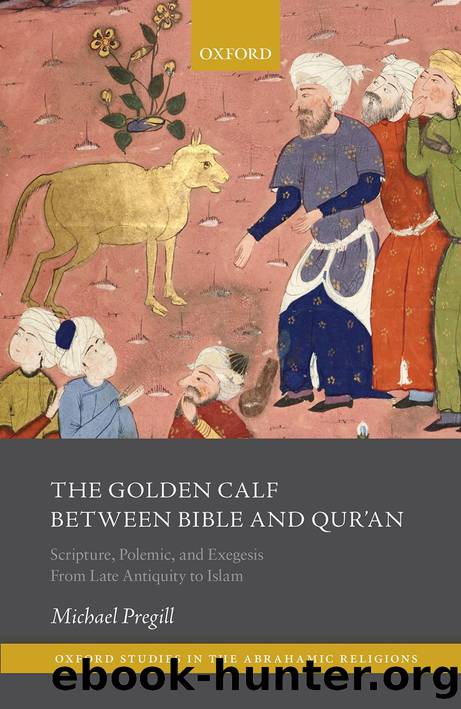The Golden Calf Between Bible and Qur'an: Scripture, Polemic, and Exegesis From Late Antiquity to Islam by Michael Pregill;

Author:Michael Pregill; [Pregill, Michael E.]
Language: eng
Format: epub
ISBN: 9780192593634
Publisher: OUP Premium
Published: 2020-07-21T00:00:00+00:00
Part III
The Qurâanic Calf Episode
6
The Qurâanic Calf Episode Between Orientalism and Islamic Tradition
Late Antiquity, Islamic origins, and the Qurâan
As the preceding chapters have shown, the exegesis of the Golden Calf narrative in Jewish and Christian circles in the period preceding the rise of Islam reflects both an ongoing contest over the ultimate significance of the episode and a persistent state of proximity, even intimacy, between parallel communities of interpretation. The ongoing rivalry between Jewish and Christian exegetes at this time is symptomatic of broader conditions in the Near East and Mediterranean between the third and the eighth century ce, the period now commonly termed Late Antiquity.1 Numerous trends emerged during this era that would prove to be of tremendous significance for the history of the civilizations of western Eurasia: the decline and eventual disappearance of classical polytheisms and the spread of various forms of monotheism, most of which were rooted in the Israelite covenantal, prophetic, and scriptural legacy; the general hardening of distinctions between systems of belief and ritual, with the consequent ossification and polarization of formerly diffuse, fluid, and mutually permeable religious identities; and an ever-intensifying pattern of competition between communities, entailing implicit or explicit claims to an exclusive, or at least superior, path to truth, and even to the sole authentic means of individual and collective salvation.
Throughout the interconnected Mediterranean and Near Eastern worlds, a process of communal sclerosis set in, and both discursive expressions of hostility and actual violence between everyday believers increasingly became the order of the day.2 Moreover, in this period, imperial powers frequently came to legitimate themselves through affiliation with one or another religious hierarchy, contributing to the greater centralization and institutionalization of what would become the major religious traditions dominating the region in the medieval period. In turn, belief systems and communities lacking imperial patronage or recognitionâwhether actual âminoritiesâ or notâstruggled to justify themselves against the claims of rivals who could now command the coercive powers of the state.
Many Jewish communities came to be marginalized in this way after the onset of Christianization in the Roman Empire in the fourth century, but other examples in the Roman sphere come to mind, including that of âpaganismâ itself, to say nothing of alternative formations of Christianity deemed to be hereticalâor at least less than perfectly orthodoxâby imperial and ecclesiastical authorities. Though less well-documented, analogous processes seem to have affected communities across the eastern frontier in the Sasanian Empire, the other great power in the region that challenged the hegemony of Rome beginning in the third century. Here too religious communities increasingly tended to coalesce around hierarchized scripturalist formations such as institutional Zoroastrianism, Assyrian Christianity, or the Judaism of the Babylonian academies; the alternativesâagain including traditional religious expressions deemed to be âpaganismâ as well as âhereticalâ forms of native Iranian religion, Judaism, and Christianityâwere similarly eliminated or assimilated. In areas such as Iraq, the extreme diversity of forms of religiosity and communal affiliation led to a vibrant and persistent competition between groups; spokesmen of numerous communities
Download
This site does not store any files on its server. We only index and link to content provided by other sites. Please contact the content providers to delete copyright contents if any and email us, we'll remove relevant links or contents immediately.
Phoenicians among Others: Why Migrants Mattered in the Ancient Mediterranean by Denise Demetriou(608)
american english file 1 student book 3rd edition by Unknown(607)
Verus Israel: Study of the Relations Between Christians and Jews in the Roman Empire, AD 135-425 by Marcel Simon(591)
Caesar Rules: The Emperor in the Changing Roman World (c. 50 BC â AD 565) by Olivier Hekster(578)
Basic japanese A grammar and workbook by Unknown(573)
Europe, Strategy and Armed Forces by Sven Biscop Jo Coelmont(520)
Give Me Liberty, Seventh Edition by Foner Eric & DuVal Kathleen & McGirr Lisa(497)
Banned in the U.S.A. : A Reference Guide to Book Censorship in Schools and Public Libraries by Herbert N. Foerstel(492)
The Roman World 44 BC-AD 180 by Martin Goodman(478)
Reading Colonial Japan by Mason Michele;Lee Helen;(469)
DS001-THE MAN OF BRONZE by J.R.A(462)
Introducing Christian Ethics by Samuel Wells and Ben Quash with Rebekah Eklund(456)
Imperial Rome AD 193 - 284 by Ando Clifford(454)
The Oxford History of World War II by Richard Overy(454)
The Dangerous Life and Ideas of Diogenes the Cynic by Jean-Manuel Roubineau(451)
Catiline by Henrik Ibsen--Delphi Classics (Illustrated) by Henrik Ibsen(427)
Language Hacking Mandarin by Benny Lewis & Dr. Licheng Gu(410)
Literary Mathematics by Michael Gavin;(407)
Brand by Henrik Ibsen--Delphi Classics (Illustrated) by Henrik Ibsen(390)
